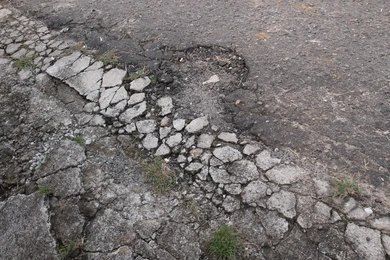Top Signs Your Asphalt Parking Lot Needs Repairs
Your parking lot serves as the first impression of your property, and a well-maintained lot ensures safety, enhances curb appeal, and meets necessary regulations. However, even the best asphalt surfaces eventually show signs of wear and tear. Recognizing these signs early can save you from costly repairs and potential liabilities. Let’s explore the top signs your asphalt parking lot needs repairs and how addressing these issues promptly can make a difference.
1. Cracks in the Surface
Why It Happens:
Cracks are the most common sign of asphalt deterioration and can result from temperature fluctuations, water infiltration, or heavy traffic loads.
What to Look For:
- Hairline Cracks: Often the first sign of distress, these can quickly grow if ignored.
- Alligator Cracking: A network of interconnected cracks resembling alligator skin.
Why It Matters:
Cracks allow water to seep into the foundation, weakening the asphalt and causing more significant damage. If your parking lot has noticeable cracks, check out our asphalt crack sealing services to address the problem before it worsens.
2. Potholes
Why It Happens:
Potholes occur when cracks allow water to penetrate, eroding the base layer and creating voids that collapse under pressure.
What to Look For:
- Depressions or holes that are hazardous to vehicles and pedestrians.
- Puddles forming inside these holes after rain.
Why It Matters:
Potholes pose safety risks and may lead to ADA compliance violations if they restrict accessibility. Learn how our pothole repair solutions can restore your parking lot's safety and functionality.
3. Fading Color
Why It Happens:
Prolonged exposure to UV rays and oxidation causes asphalt to lose its rich, black color, turning it gray.
What to Look For:
- Uneven coloring across the surface.
- Areas that appear bleached or dull.
Why It Matters:
Fading is not just cosmetic; it indicates weakening of the asphalt binder, which can lead to further structural damage. Protect your parking lot’s surface with our sealcoating services.
4. Drainage Problems
Why It Happens:
Improper grading or settling can disrupt drainage systems, causing water to pool.
What to Look For:
- Standing water after rainfall.
- Water flowing toward buildings or entryways.
Why It Matters:
Poor drainage accelerates asphalt deterioration, weakens the foundation, and creates slipping hazards. Ensure your parking lot drains efficiently with our asphalt maintenance solutions.

5. Uneven Surfaces
Why It Happens:
Shifting soil, heavy usage, or poor installation can create dips, humps, or uneven areas.
What to Look For:
- Noticeable depressions or raised sections.
- Vehicles experiencing jolts while driving.
Why It Matters:
Uneven surfaces can damage vehicles and increase the risk of trips and falls. If your parking lot feels uneven, explore our resurfacing services to restore its smoothness.
6. Raveling or Loose Aggregates
Why It Happens:
Asphalt raveling occurs when the surface layer breaks apart due to age, traffic, or weather conditions.
What to Look For:
- Loose gravel or pebbles on the surface.
- A rough, uneven texture.
Why It Matters:
Raveling reduces the structural integrity of your parking lot and creates an unprofessional appearance. Learn how our asphalt repair services can restore your lot to pristine condition.
7. Edge Deterioration
Why It Happens:
Edges are more vulnerable due to lack of support and exposure to water and vegetation.
What to Look For:
- Crumbling or broken edges.
- Gaps between the edge of the asphalt and adjacent surfaces.
Why It Matters:
Edge damage can spread inward, affecting the stability of the entire parking lot. Protect your asphalt's longevity with our comprehensive repair services.
8. Frequent Repairs and Patches
Why It Happens:
Recurring issues often signal that the asphalt is nearing the end of its lifespan.
What to Look For:
- Multiple patchwork repairs in close proximity.
- Repairs that don’t seem to last.
Why It Matters:
Constant repairs are inefficient and costly compared to comprehensive resurfacing or replacement. For a long-term solution, consider our asphalt replacement services.
Why Addressing These Signs is Crucial
- Safety: Cracks, potholes, and uneven surfaces pose risks to vehicles and pedestrians.
- Cost-Efficiency: Prompt repairs prevent minor issues from escalating into expensive overhauls.
- Compliance: Maintaining an ADA-compliant parking lot is essential to avoid legal penalties.
- Curb Appeal: A well-maintained parking lot enhances the professional image of your property.
For more details, visit our asphalt services page and learn how we can help you maintain your parking lot.
Frequently Asked Questions
1. How often should I inspect my parking lot for damage?
You should inspect your parking lot at least twice a year—preferably in spring and fall—to catch issues early.
2. Can minor cracks wait to be repaired?
No, even small cracks can expand and lead to more severe damage. Address them promptly with crack sealing.
3. What’s the difference between resurfacing and replacement?
Resurfacing adds a new layer to the existing asphalt, while replacement involves removing and reinstalling the entire structure.
4. Does LI Asphalt provide ADA compliance upgrades?
Yes, we ensure your parking lot meets ADA standards, including proper grading, striping, and signage.
5. How long does asphalt repair take?
The timeline depends on the extent of the damage, but most repairs can be completed in a few days.
Conclusion
Your asphalt parking lot is more than just a surface; it’s an essential part of your property’s functionality and appearance. Recognizing the signs of damage early ensures safety, saves money, and keeps your lot compliant. Whether you’re dealing with cracks, potholes, or fading, timely repairs are the key to extending the lifespan of your asphalt.
For expert solutions, trust L.I. Asphalt to handle all your asphalt repair and maintenance needs. Contact us today for a consultation!
